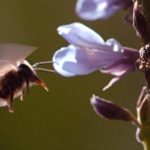 “Evolution involves changes in the frequency of gene variants across a population, and that’s what we’re seeing in Puerto Rico,” said Robinson.
“Evolution involves changes in the frequency of gene variants across a population, and that’s what we’re seeing in Puerto Rico,” said Robinson.
A study of Puerto Rico’s Africanized honey bees revealed that regions of their DNA are similar to those of European honey bees.
The creature – which are more docile than the typical killer bees – have retained the majority of their African honey bee ancestors’ hardy genetic traits while adopting the gentler demeanor of European bees, according to the researchers.
“Genetically diverse gentle honeybees could help secure agricultural production by providing pollinators more resistant to threats such as parasites and diseases,” the scientific piece stated.
Animal pollination is responsible for between 5-8% of global agricultural production, which a declining bee population threatens.
Researchers sourced and arranged genomes of 30 “gentle” Puerto Rican bees, 30 Africanized bees from Mexico and 30 European bees from Illinois.
“The benefit of having these three populations is that you can compare and contrast between the three,” University of Illinois researcher, Arian Avalos, said.
“We asked, ‘How is the genome of the gentle Africanized bee different than other Africanized populations? What parts of the genome are similar to European bees?'”
The research team found that specific regions of the bees’ DNA had changed from the African to European. This new discovery bodes well for future advancements in the bee population, since the hardiness of their primary ancestor – minus the aggression – has been retained.
University of Illinois entomology professor Gene Robinson, crop sciences professor Matthew Hudson and Chinese Academy of Sciences’ Guojie Zhang and Hailin Pan participated in the research.
“Evolution involves changes in the frequency of gene variants across a population, and that’s what we’re seeing in Puerto Rico,” said Robinson.
Nature Communications journal published that these changes in the insects took place over the better part of the last three decades.
“Now we know that these gentle Africanized bees can be genetically distinguished both from other Africanized honey bees and from European honey bees,” Robinson explained.
“The fact that we’ve shown that the genetics of these Puerto Rican bees are very distinct from the European bees, and the fact that they are demonstrably gentle, makes it very interesting as a potential way to mitigate pollinator decline,” Hudson added.
Africanized bees, offspring of African and European honey bees, were found in Puerto Rico in the 1990s. The hybrid bees, which previously escaped from an experimental program in Brazil in the 50s, acquired the characteristics through evolution.
Co-author of the study and biology professor at the University of Puerto Rico, Tugrul Giray, initially reported on the bees in the journal Evolutionary Applications in 2012.

